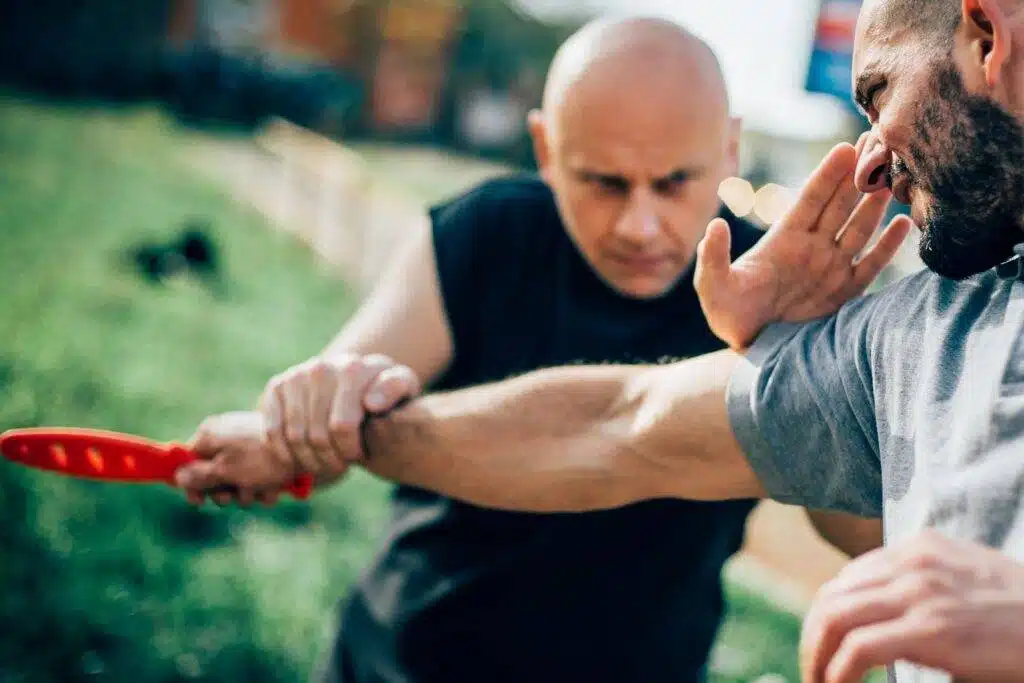When facing violent crime charges in Colorado, it’s crucial to understand the distinctions between different forms of assault, as each offense is defined differently and carries with it unique penalties and implications.
Let’s break down the key differences between assault, battery, and menacing.
Assault vs. Physical Contact Under Colorado Assault Laws
In Colorado, “battery” is not a separate offense from assault. Instead, violent or unwanted physical contact is prosecuted under assault statutes.
- Assault: This offense generally involves causing bodily injury to another person, either knowingly, recklessly, or (in some cases) with criminal negligence. Some degrees of assault also require the use of a deadly weapon or proof of serious bodily injury.
- Physical contact under assault laws: Acts that would be considered “battery” in other states, such as slapping, pushing, or kicking, are treated as assault or aggravated assault in Colorado.
Various types of assault have their own legal criteria, potential consequences, and possible defenses. For example, a self-defense argument may differ depending on whether the charge involves a threat of harm or actual physical contact.
Types of Assault Charges in Colorado
Colorado defines assault as knowingly or recklessly causing bodily injury to another person. There are several types of assault charges you can receive, each with varying levels of severity.
- First-degree assault: Involves knowingly causing serious bodily injury, permanent disfigurement, or disability. If the defendant displayed a clear disregard for human life, these charges can still apply even if the harm was caused unintentionally. These charges also apply when someone knowingly threatens certain protected personnel (i.e. police officers, firefighters, or medical providers) with a weapon while they are performing their duties. First-degree assault is a Class 3 felony.
- Second-degree assault: The difference between second and first-degree assault lies in the severity of the injuries caused. While first-degree assault involves potentially deadly harm, second-degree assault charges apply to less than deadly injuries. Second-degree assault is charged as a Class 4 felony, but certain circumstances can raise it to a Class 3 felony.
- Third-degree assault: Occurs when someone knowingly or recklessly causes bodily injury to another person. This is a Class 1 misdemeanor.
Penalties for assault can vary depending on prior convictions, whether a weapon was used, and whether the assault caused a lasting injury. Courts may impose fines, probation, community service, anger management programs, or imprisonment.
What Is Aggravated Assault?
Aggravated assault covers severe forms of assault in Colorado – it involves causing serious bodily injury to another person and/or using a deadly weapon during the commission of the assault. Legally, “aggravated assault” is not a separate charge; instead, it is used to describe first- and second-degree assaults. If you are found guilty, penalties can include a lengthy prison sentence and substantial fines, which is why obtaining early legal representation is a must.
What’s the Difference Between Assault and Menacing?
In Colorado, menacing is defined as “knowingly placing or attempting to place a person in a position where they’re in fear of imminent serious bodily injury.” This charge differs from assault in both intent and effect.
Unlike assault, which requires actual bodily injury, menacing is about causing fear of imminent serious bodily injury, even without physical contact. Menacing is a Class 1 misdemeanor in Colorado, but if committed with a deadly weapon or any object that the victim reasonably believes to be a deadly weapon, it becomes a Class 5 felony.
Self-Defense in Colorado
Colorado law allows individuals to use reasonable force to defend themselves from imminent harm. Key points include:
- The threat must be immediate and unavoidable.
- The response must be proportionate to the threat (excessive force can negate a self-defense claim).
- Self-defense is not valid if the person claiming it was also the one who provoked the confrontation.
For example, striking someone to prevent injury in an immediate attack may qualify as self-defense. However, using excessive force could lead to assault or aggravated assault charges.
Assault & Menacing in Colorado: Penalties and Sentencing
Penalties for assault and menacing vary depending on several factors, including the severity of the offense, the use of weapons, and the extent of the victim’s injuries.
For example, menacing is generally a Class 1 misdemeanor, but it escalates to a Class 5 felony if a deadly weapon is used. Assault charges can range from misdemeanors to felonies, depending on whether serious bodily injury occurred.
Courts also consider aggravating and mitigating factors like criminal history, level of injury, use of a weapon, and whether the act was premeditated. These factors influence the length of jail time, probation terms, and fines imposed.
Working with a Violent Crime Defense Attorney
If you are facing charges for assault or menacing in Colorado, working with a qualified violent crime defense attorney is critical. A knowledgeable attorney can:
- Analyze the facts and identify potential defenses
- Clarify the distinctions between charges, such as assault vs. menacing
- Negotiate plea deals or pursue strategies to reduce penalties
- Protect your legal rights throughout the criminal justice process
Early legal guidance increases the likelihood of a favorable outcome, especially when charges involve weapons or serious injury.
Contact a Violent Crimes Attorney Right Away
Understanding the distinctions between assault and menacing under Colorado law is essential. Each offense has unique definitions, potential penalties, and legal implications. The difference between threats and actual physical contact, use of weapons, and extent of victim injuries all influence how cases are handled.
Knowledge of self-defense rights and sentence variations can further support your legal strategy. Consulting a skilled violent crime defense attorney helps ensure your rights are protected and your defense strategy is informed. Early action and expert legal advice can make a world of difference in navigating Colorado’s criminal justice system.








